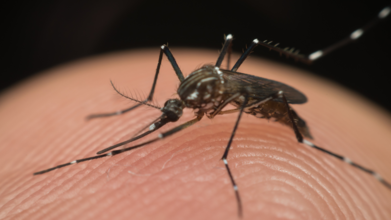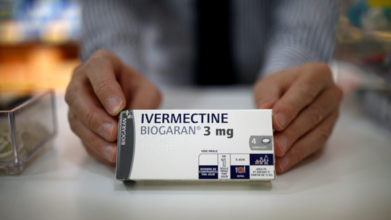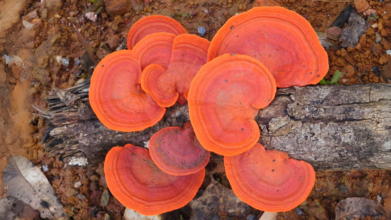- Health Conditions A-Z
- Health & Wellness
- Nutrition
- Fitness
- Health News
- Ayurveda
- Videos
- Medicine A-Z
- Parenting
- Web Stories
Chikungunya In China: CDC Warns Travellers As Mosquito-Borne Disease Spreads In Guangdong

(Credit-Canva)
Health officials have issued a serious travel warning because of a recent spike in Chikungunya cases. The Centers for Disease Control and Prevention (CDC) has put out a Level 2 travel warning for a part of China called Guangdong Province, telling people to be extra careful there. The city of Foshan is where most of the cases are, and the government has taken strong actions to stop the spread, similar to what was done early in the COVID pandemic.
Why Is Chikungunya A Global Problem?
Chikungunya is a painful sickness caused by a virus that you get from a mosquito bite. The name comes from an African word that means "to become bent over," which describes the way people stand because of the severe joint pain. While most people don't die from it, the joint pain can be very intense and can last for weeks, months, or even years. It's important to know that you can't catch chikungunya from another person; it's only spread by a specific type of infected mosquito.
Even though most people get better in about a week, some people are at higher risk for serious or long-lasting problems. This includes older adults, newborns, and anyone with other health issues. The CDC also advises pregnant women, especially those who are close to giving birth, to avoid traveling to these areas because the virus can pass from the mother to the baby during birth and can be very dangerous for the newborn.
Also Read: Baby Dies of Whooping Cough After Mother Didn’t Get Vaccinated
What Countries Are In Chikungunya Travel Alert
According to CDC, a travel warning has been placed for several countries for chikungunya outbreaks in several countries, including:
- Guangdong Province, China
- Kenya
- Madagascar
- Somalia
- Sri Lanka
The CDC decides to post these warnings based on several factors, such as an increase in confirmed cases among residents and travelers, the size of the outbreak, and whether the virus has appeared in a new area.
Additionally, even if there isn't a current outbreak, some countries have a consistently higher risk for U.S. travelers. There are now vaccines available to help protect you from the virus. You can find more information about these vaccines and other precautions on the CDC's website. This means at least one U.S. traveler has been diagnosed with chikungunya there in the last five years. These countries include:
- Brazil
- Colombia
- India
- Mexico
- Nigeria
- Pakistan
- Philippines
- Thailand
How Can We Prevent Chikungunya?
Since there is no cure or special medicine to treat chikungunya, the best thing to do is prevent it. The CDC gives a few simple tips for travelers to stay safe:
- Use bug spray that is approved by the EPA.
- Wear long-sleeved shirts and long pants to cover your skin.
- Stay in places with air conditioning or screens on the windows and doors to keep mosquitoes out.
- Avoid areas with standing water, because that's where mosquitoes lay their eggs.
Also Read: Blood Thinner Shows Stronger Protection Against Heart Problems Than Standard Drug
In addition, two vaccines for chikungunya are now approved in the United States, and travelers are encouraged to get vaccinated. Worldwide, millions of people get infected with this virus every year, but luckily, it only causes a small number of deaths. In the U.S., all the cases reported this year have been from people who traveled abroad.
People In Texas Could Soon Buy Ivermectin Without Any Prescription: What You Need to Know

Credits: Reuters
The Texas House of Representatives has passed House Bill 25, permitting the over-the-counter sale of ivermectin, a medication that has been used for decades to treat parasitic illnesses. The bill passed Wednesday after almost three hours of discussion, on an 87-47 vote and one member who was present but not voting. If the bill passes the Senate, Texans would be able to buy ivermectin from pharmacists directly, as with other drugs such as Sudafed.
Ivermectin, which was first discovered in the 1970s by Japanese microbiologist Satoshi Ōmura, has been a reliable cure for parasitic diseases like river blindness, scabies, lice, and strongyloidiasis. Its impact on global health earned Ōmura and collaborator William Campbell the 2015 Nobel Prize in Physiology or Medicine. The medication targets parasites by paralyzing and destroying them and disrupting their nerve and muscle functions.
Despite its long-standing medical credibility, ivermectin became a contentious topic during the COVID-19 pandemic. Early laboratory studies suggested antiviral activity, prompting some to tout it as a COVID-19 treatment. Subsequent research, however, failed to show meaningful benefits for patients, and the U.S. Food and Drug Administration (FDA) has repeatedly emphasized that ivermectin is not authorized or approved to treat COVID-19. The FDA warns that abuse, especially with the veterinary form, can result in serious side effects such as seizures and coma.
Rep. Joanne Shofner, a Nacogdoches Republican, wrote the bill, which has been identified as a priority for Governor Greg Abbott and House Speaker Dustin Burrows during the Legislature's second special session. Texas would join Arkansas, Idaho, Louisiana, and Tennessee as the fifth state to allow the sale of ivermectin without a prescription. Supporters point to "medical freedom" as a driving factor, saying patients deserve the ability to use treatments they think can help them, especially when vaccines or conventional therapy are rejected or considered inadequate.
The passage of the bill is part of a larger movement of alternative medicine activists, fueled by social media sites that have promoted ivermectin for a host of off-label applications, from COVID-19 to cancer care.
Why Is Ivermectin So Popular?
Though the FDA-approved applications of ivermectin still only include parasitic diseases, it persists in showing up in alternative medicine forums. It turned into an icon of skepticism surrounding traditional medicine in the time of the pandemic, spurring demand long after vaccines had been found. In the present day, ivermectin is being researched for use in cancer, though evidence is currently narrow and inconclusive.
During the 2025 American Society of Clinical Oncology (ASCO) Annual Meeting, preliminary trials testing ivermectin combined with immunotherapy in metastatic triple-negative breast cancer were inconclusive: six of eight patients had disease progression, one showed partial response, and one had stable disease. Oncologists warn that promising laboratory results do not yet constitute clinican evidence for ivermectin in fighting cancer.
What Are The Safety and Regulatory Concerns of Ivermectin Drug?
The FDA emphasizes that ivermectin is safe when taken as prescribed for parasitic diseases, but inappropriately or in error, it can be hazardous. Veterinary products, usually in greatly higher concentrations, are quite hazardous to humans. Opponents caution that the sale of ivermectin over the counter may lead to self-medication, with resulting adverse events.
Further, public health practitioners observe that although OTC access would be attractive to individuals who desire control of medical choices, it would complicate pharmacist counseling and regulatory control. Patients would not necessarily know proper dosing, interactions with other drugs, or the hazard of off-label use.
The Texas debate brings attention to persistent tensions between patient autonomy and medical authority. Supporters of OTC access posit that adults must be capable of making intelligent decisions, pointing to past safety in parasitic disease treatment. Opponents suggest wider availability would worsen misinformation about COVID-19 and cancer claims.
Social media has raised the level of interest in ivermectin, frequently citing cherry-picked studies or anecdotal experience as proof of efficacy. This pattern reflects a larger challenge for public health: the tension between patient autonomy and evidence-based recommendations.
House Bill 25 now heads to the Texas Senate, where it will be determined. If passed, Texans could soon have simpler access to a drug with a complicated past adulated for its Nobel Prize-winning use as an anti-parasitic but contested for its unproven uses in viral infections and cancer.
Experts note that although ivermectin does have valid medical applications, it is not a panacea. Those looking to use it for off-label purposes should see qualified healthcare professionals in an effort to reduce risk.
Texas' possible shift towards over-the-counter sales of ivermectin points to a wider cultural and medical discussion: the interplay of individual choice, scientific evidence, and public safety. As ivermectin is an important agent against parasitic disease, its greater availability sparks concerns about prudent use, public health education, and the place of evidence in shaping medical practice.
This battle is hardly over, but Texans and Americans generally are paying close attention as politicians work out the balance between independence, control, and science.
Rare Fungus Shows Promise As 'Nature’s Weapon' That Could Fight Cancer-Cells

Credits: iStock (representational)
A rare fungus, deep in the Taiwanese forests, quietly harbors a secret that could soon revolutionize the way the medical community fights and treats cancer. Antrodia cinnamomea, or Taiwanofungus camphoratus, has been a part of traditional herbal medicine for centuries, valued for its medicinal properties. But modern research has uncovered something incredible: a particular sugar molecule found in this fungus can actually target and destroy cancerous cells.
Antrodia cinnamomea is highly unique, growing exclusively on a single species of endangered tree in Taiwan. Its scarcity in the wild makes it a rare find, yet its medicinal reputation has persisted for centuries. Traditionally used to boost immunity and improve liver health, the fungus is now under the scientific spotlight for its anti-cancer and anti-inflammatory properties.
National Taiwan University and National Yang Ming Chiao Tung University researchers looked at a series of chemicals that the fungus produces, which are sulfate polysaccharides (SPS). The sugar molecules, also referred to as sulfated galactoglucans, bring glucose, galactose, and sulfate together into one complex molecule. SPS have been associated with anti-inflammatory and anti-cancer activities, but the mechanism had remained unclear until now.
Nature's Secret Against Cancer
For deeper study of these molecules, researchers grew A. cinnamomea in the lab, avoiding the necessity to extract it from the threatened trees. This made it possible to have controlled cultivation and extraction of SPS compounds as needed. The researchers designed technology to induce the fungus to accumulate higher levels of SPS, which can then be analyzed in detail for its bioactive content.
Among the compounds discovered, one of them stood out in particular—labeled N50 F2. In cell experiments, N50 F2 diminished inflammation markers while specifically suppressing lung cancer cells. The combined effect—both anti-inflammatory and anti-cancer—indicates that the fungus acts on more than one biological pathway and thus could be an attractive candidate for future treatments.
How Does This Impact and Improve Cancer Treatment?
Though these findings are so far limited to in vitro experiments (lab-grown cells), the implications are considerable. Inflammation has been identified as a factor in cancer development, so drugs that blunt inflammation while specifically killing cancer cells could be the foundation for extremely potent treatments.
This research demonstrates that A. cinnamomea SPS possesses intense anti-inflammatory activity and suppresses cancer cells in vitro," the scientists said in their article published in Carbohydrate Polymers.
The find serves to highlight the potential of researching natural compounds to combat cancer. Nature already harbors a number of substances employed in current oncology—ranging from plant-derived paclitaxel to components of scorpion venom. A. cinnamomea is part of an increasingly long list of organisms with possible breakthroughs, either by killing off cancer cells directly, stopping them from spreading, or making current therapies more effective.
Despite its promise, turning this discovery into a usable treatment will require extensive research. The step from lab-grown cells to clinical application is substantial. Safety, dosage, and efficacy in humans must all be rigorously tested.
However, the researchers are optimistic. “With a fully controlled production and extraction process, we are optimistic about future applications in both health supplements and clinical treatments,” says Chia-Chuan Chang, pharmaceutical scientist at National Taiwan University.
Lab cultivation in a controlled manner also enables the fungus to be grown sustainably, overcoming the ethical issue of harvesting it from vulnerable trees. This implies that even therapies developed in the future might easily be scaled without harming the unusual natural environments in which A. cinnamomea naturally occurs.
What Is The Importance of Natural Compounds in Cancer Treatment?
The identification of N50 F2 is illustrative of a trend in medical science more broadly: turning to nature to find answers that cannot be derived through synthetic chemistry. From around the world, scientists are scrounging fungi, plants, ocean creatures, and even tardigrades for compounds that can combat cancer. From examining these natural chemicals, researchers hope to develop treatments that are better targeted, with fewer side effects than conventional chemotherapy.
Antrodia cinnamomea's SPS compounds are noteworthy as they target both tumor growth and inflammation at the same time. Inflammation is a chronic feature of several cancers, such as lung, liver, and colon cancers. Targeting this pathway, N50 F2 could provide a multipronged strategy for disease control.
The journey from laboratory discovery to a clinically approved treatment is long, but this achievement is a crucial first step. Scientists have now a clear target: SPS molecules such as N50 F2. The future will include studies on animals, tests for toxicity, and ultimately, clinical trials in humans.
This study proves the potential of natural fungal compounds as a pharmaceutical," says Chang. "With further research, these compounds may someday be a major weapon against cancer.
Free Chickenpox Vaccine In England: UK Medical Officer Backs Prevention Against ‘Life-Threatening’ Illness

(Credit-Canva)
UK government has launched a health initiative will provide eligible children vaccination to fight measles, mumps, rubella and chickenpox from 2026 January. This initiative aims to help “raise the healthiest generation of children ever, while reducing sick days and time parents take off work” says Gov UK.
Backing this UK’s the chief medical officer (CMO), also posted his opinions on X, reposting one of NHS’s posts announcing the initiative.
In the post he mentioned that “Chickenpox is common. Usually it is just unpleasant, but it can be severe or life threatening. A long-established vaccine to prevent it will be offered to all children rather than only those who can pay. Immunity by vaccination is safer than by infection.”
Why This Chickenpox Vaccination Drive Is Important?
Starting in January 2026, the UK government will launch a new vaccination program to protect children against chickenpox. The program will reach about half a million children each year and will use a combined vaccine that also protects against measles, mumps, and rubella (MMRV).
This new initiative is designed to help create a healthier generation of children. By preventing chickenpox, the program will reduce sick days for kids and cut down on the time parents have to take off work to care for them.
Who Is Eligible for This Chickenpox Vaccine?
The new vaccine will be given to eligible children during their routine doctor's appointments. The rollout is expected to save the National Health Service (NHS) an estimated £15 million each year in treatment costs for chickenpox. It will also help the UK economy by reducing the an estimated £24 million in lost income and productivity from parents missing work.
This chickenpox vaccine has been used safely for decades in many other countries, including the United States, Canada, Australia, and Germany. These countries have seen a major drop in both chickenpox cases and hospitalizations since they started their own vaccination programs.
Stephen Kinnock, the Minister of State for Care, stated that the program gives parents "the power to protect their children from chickenpox and its serious complications, while keeping them in nursery or the classroom."
Is Chickenpox Life-Threatening?
While most people think of chickenpox as a mild illness, it can lead to serious complications. It can lead to severe complications that require a hospital stay, such as serious infections, brain swelling, or even a stroke. In rare cases, it can even be fatal. The government’s decision to offer this vaccine is based on expert advice from scientists who studied the serious impact of chickenpox on children's health.
The decision to add the chickenpox vaccine to the routine schedule was based on expert advice from the Joint Committee on Vaccination and Immunisation (JCVI). Currently, a private chickenpox vaccination can cost around £150, but with this new program, it will be available for free on the NHS.
This is the first time a new disease has been added to the routine childhood vaccination program since the meningitis B vaccine in 2015. It is a major part of the government's wider goal to improve the nation's health and shift the focus of healthcare from treating sickness to preventing it.
© 2024 Bennett, Coleman & Company Limited

